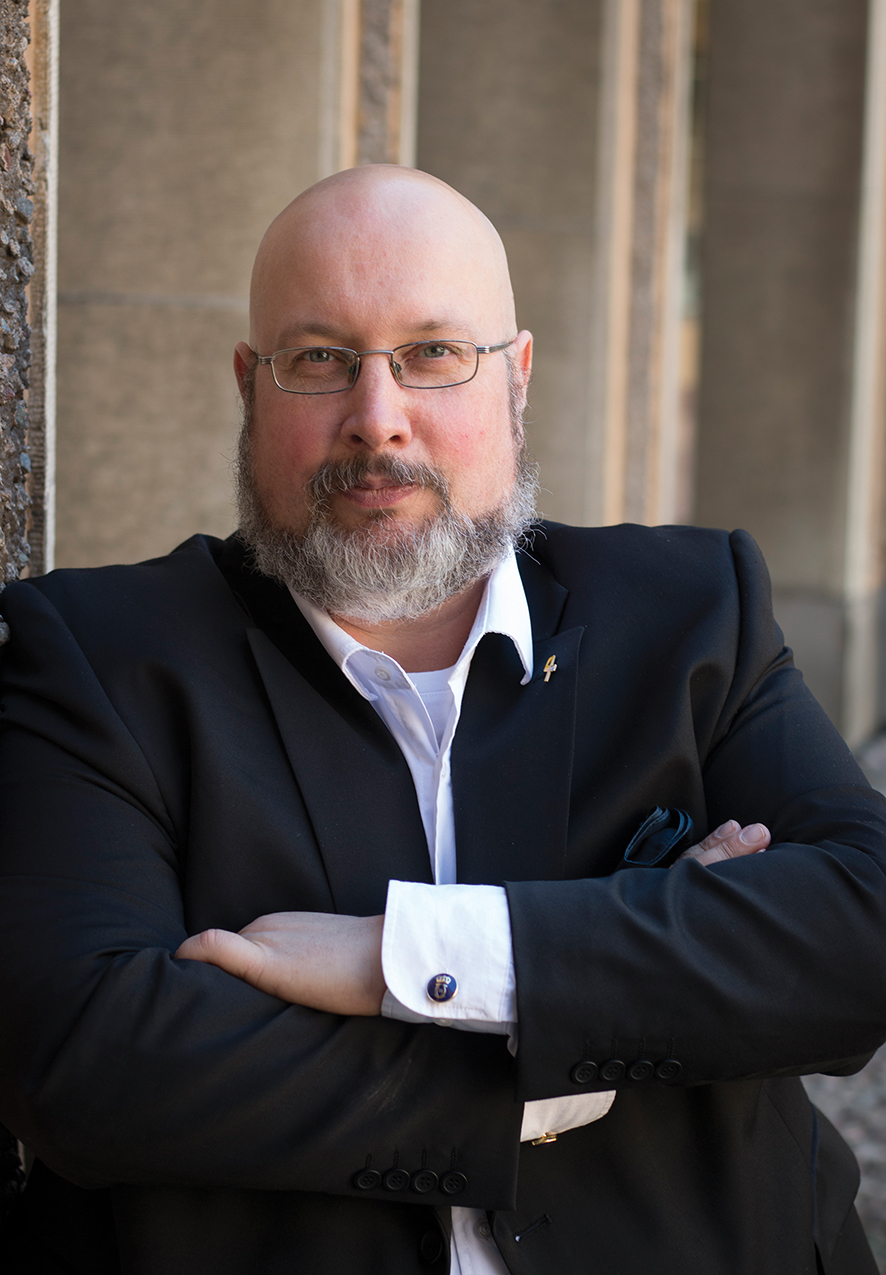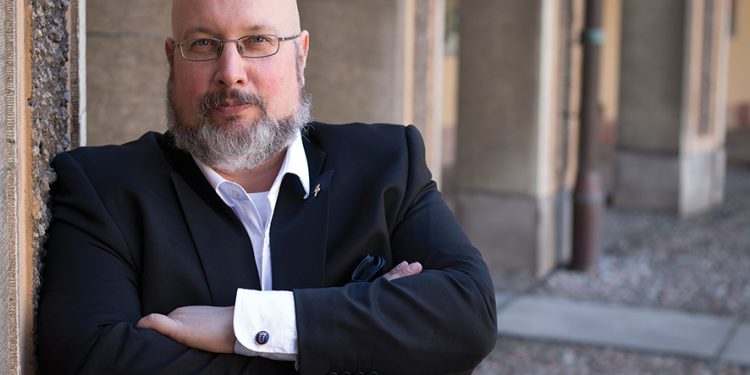Elected as a fellow of the Royal Swedish Academy of War Sciences in 2020, Patrik Oksanen is a Swedish journalist and writer. He formerly served as the Europe correspondent of Sveriges Television. Since 2015, he’s been hosting the podcast series Podd72 on security policy, defense and information warfare. Radio Free Europe/RL’s Georgian Service sat down with him to discuss his country’s accession to NATO after 200 years of military non-alignment.
What does becoming a NATO member mean for Sweden, NATO, and Russia?
It means that Sweden, after a long period, after the end of the Cold War, has at last come home. When NATO was founded in 1949, Sweden opted out, and that was largely because of Finland. Finland was at that time tied down by its partnership and cooperation pact with the Soviet Union, which was a consequence of World War Two. And, at that time, people were thinking that if Sweden joined NATO in 1949, there would be consequences for Finland, and that Finland might end up like Czechoslovakia. So we stayed outside of NATO because of Finland. And when Finland decided to join, the decision was very easy for Sweden.
For NATO, it means that NATO is now secured more properly on the northern flank because Swedish territory is crucial for the defense of the Baltic countries, with its strategically located islands.
And Finland is more easily defended too. Sweden is a country that lies strategically as a logistical hub and support area for the frontlines states. And look at what Sweden contributes: It has a good Air Force, good submarines, high technology, a small but good Navy and also competence in Arctic winter warfare, because, even though our armed forces are small, they are highly competent.
For Russia, it’s a strategic failure, because one of the key issues for Russia has been to keep Finland and Sweden out of NATO. This is a strategic setback for Russia, and it means that it should be harder for them to drive wedges between countries, and that means that they have to take more consideration into account when they think about the strategic map.
A very popular turn of phrase on Sweden and Finland becoming NATO members has been that the Baltic Sea will become a “NATO lake.” How do we expect Russia to react to that?
Well, first of all, I don’t subscribe to that thesis, I think it’s intellectually sloppy, and it leads us to the wrong conclusion. Russia is pushed back in the Baltic Sea, but it’s not been made into a “NATO lake.” We should expect more hybrid activities, yes, but Russia will try to contest the lake idea as much as possible by various means, even if they are pushed back geographically in the area. So I would argue that Russia will still be able to create problems – it will be much harder for them, sure, but it will not be uncontested, it won’t turn into a NATO lake.

Putin said he “had no problem with Sweden and Finland becoming NATO members, as long as NATO infrastructure is not installed there.” Should we expect such NATO infrastructure in Sweden?
First of all, we should never listen to what Putin says. He’s a liar, and he changes what he says as it suits him. And secondly, that will be something that Finland and Sweden decide together with our NATO partners, without Russia’s say-so. With both Finland and Sweden extending their security cooperation with the US, you can expect larger-scale cooperation, but it’s too early to say what will happen in the longer perspective, and I guess that it also depends on what’s happening in the region.
Will the Swedes go to war against Russia if Putin attacks one of their numerous small islands?
Well, Gotland, for example, is a strategically important one, and Sweden would definitely go to war to defend it, even without NATO membership, and I would have expected other countries to have helped, regardless. Now Gotland is Article Five territory, so that ambiguity, wondering what could happen, is not there anymore. It’s Article Five.
Sweden becoming a NATO member is a mere formality now, but what did it cost Sweden to get greenlights from Erdogan and Orban?
I would argue that that the practical costs weren’t that that big, but we did get taught a lesson in Realpolitik- we had a bit of a reality check. Sweden had to realize that when it comes to NATO, it’s not only bilateral things in play here, it’s a three-dimensional chessboard. I mean, for example, there was this issue with Turkey and the F-16s. It wasn’t merely an issue between Ankara and Stockholm. Then, with Hungary, we sold them a couple more Gripen planes. But that’s not a problem.
Sweden is to provide its hitherto largest military support package to Ukraine, 700 million USD. Will we see NATO-member Sweden providing JAS-39 Gripen fighter jets to Ukraine too?
My expectation is that when Sweden is a NATO member, providing Gripen to Ukraine will be on the table. And I expect it to be a quick decision, since there is a lot of support for that in Sweden, both in parliament and among Swedish society. But after making that decision, it will take a much longer time to do the proper training of the pilots, prepare the ground support and so on.
The Danish Prime Minister recently pledged their entire artillery shell reserves to the Ukrainian cause. How likely is Sweden to follow suit?
If you look at the geography of Sweden, you will realize why is it that we don’t have the luxury like the Danes to give away all the artillery shells we’ve got. So we will not empty all our ammunition stores. But what we are seeing is that Sweden is trying to ramp up ammunition production, and there are investments that will increase the volume, because what we’re seeing is a conflict that will be dragging on for a long time, and which will have an industrial warfare element to it. We see a need both to provide Ukraine with more ammunition and also to fill up our own stores. I expect our military buildup will continue, and we will try to increase the pace. We are building up the total defense concept that we abandoned during the period of peace after the Cold War; we are moving to be ready to deal with whatever comes our way. How ready are we and when? Hard to say, but we are moving in that direction.
There is huge, huge public support for Ukraine in Sweden; there is a huge understanding of what kind of threat the Putin regime poses to peace and stability in our part of the world. So, in that sense, we are more prepared than many other European countries. For example, unlike many other countries, we aren’t debating whether the problem is real or not. We’re fully aware it’s very real.
With that mindset, I suppose Sweden would have no qualms about meeting the 2% threshold of the defense spending that NATO requires and other countries keep falling short of?
We are passing the NATO threshold on our own, and we will continue to increase that in the coming years. And I expect that the Defense Commission that is in the works will propose that we plan for a level that is much higher than 2% of GDP in the coming years 2026 to 2030. There is a big, big understanding in Sweden that 2% is not the roof, 2% is more like the ground floor. We are closer to the front line, and that means that we need to be more prepared than most. We need to build up more.
Sweden had to wait two years to join NATO, but countries like Ukraine and Georgia have been waiting for more than a decade. Can they count on Stockholm’s support in making that final step forward?
Sweden is committed to the open door policy. The Swedish long-term strategic perspective entails the support of the Western integration, both into the European Union and NATO, of Ukraine and Georgia. Sweden has been working to that end in the EU for a long time, in the Eastern partnership framework.
If Putin decides Moldova and Georgia are ripe for the taking before that point, what kind of reaction should we expect from NATO in general, and Sweden in particular?
It’s a very good question, and I wish I had a good answer. I can only say that we should mentally and physically adjust to the fact that Putin seems determined to restore a Russian empire of sorts and be prepared to counter that, to rise up to the challenge.
Interview by Vazha Tavberidze














